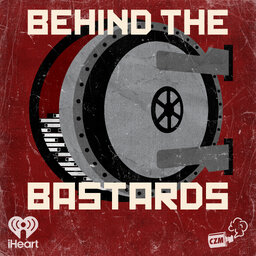Part One: How Conservatism Won
Robert sits down with David Bell to discuss how a consortium of rich failsons got together to fund a network of right wing think tanks and shift American culture in a fun new direction. (note: it was not actually fun at all)
(2 Part Series)
Sources:
- https://www.insidehighered.com/opinion/views/2023/05/09/launch-long-game
- https://www.forbes.com/sites/richardvedder/2020/01/06/the-collegiate-conservative-counter-revolution/?sh=efd1a87111c0
- https://www.theatlantic.com/past/docs/politics/polibig/eastidea.htm
- https://msuweb.montclair.edu/~furrg/gned/laphamtentacles04.pdf
- https://theintercept.com/2022/08/25/student-loans-debt-reagan/
- https://twitter.com/schwarz/status/1562521561118429187/photo/1
- https://newsarchive.berkeley.edu/news/media/releases/2004/06/08_reagan.shtml
- https://www.bestcolleges.com/news/analysis/threat-of-educated-proletariat-created-the-student-debt-crisis/
- https://michaelperelman.wordpress.com/2009/12/08/a-rationalization-for-educational-downsizing/
- https://www.nytimes.com/1933/08/20/archives/germany-watches-zionist-congress-fears-it-may-stir-up-abroad-new.html
- https://www.nytimes.com/1931/09/06/archives/germany-is-moving-toward-the-centre-pressure-of-left-and-right-is.html
- https://www.nytimes.com/1933/02/26/archives/farming-put-first-in-german-plans-economic-policy-of-the-hitler.html
- https://louisville.edu/journal/workplace/issue6/franklin.html
- https://www.whitehouse.senate.gov/news/speeches/the-scheme-1-the-powell-memo/#:~:text=Powell%20recommended%20a%20propaganda%20effort,%2C%20political%20science%2C%20and%20sociology
- https://www.reaganlibrary.gov/archives/speech/january-17-1967-statement-governor-ronald-reagan-tuition
- https://archive.org/details/rampartsmagazine00ramp/page/28/mode/2up?view=theater
In 1 playlist(s)
Behind the Bastards
There’s a reason the History Channel has produced hundreds of documentaries about Hitler but only a …Social links
Follow podcast
Recent clips

Part Four: How Jeffrey Epstein Helped Build the Modern World
1:10:16

Part Three: How Jeffrey Epstein Helped Build the Modern World
1:06:22

Part Two: How Jeffrey Epstein Helped Build the Modern World
1:02:28
 Behind the Bastards
Behind the Bastards